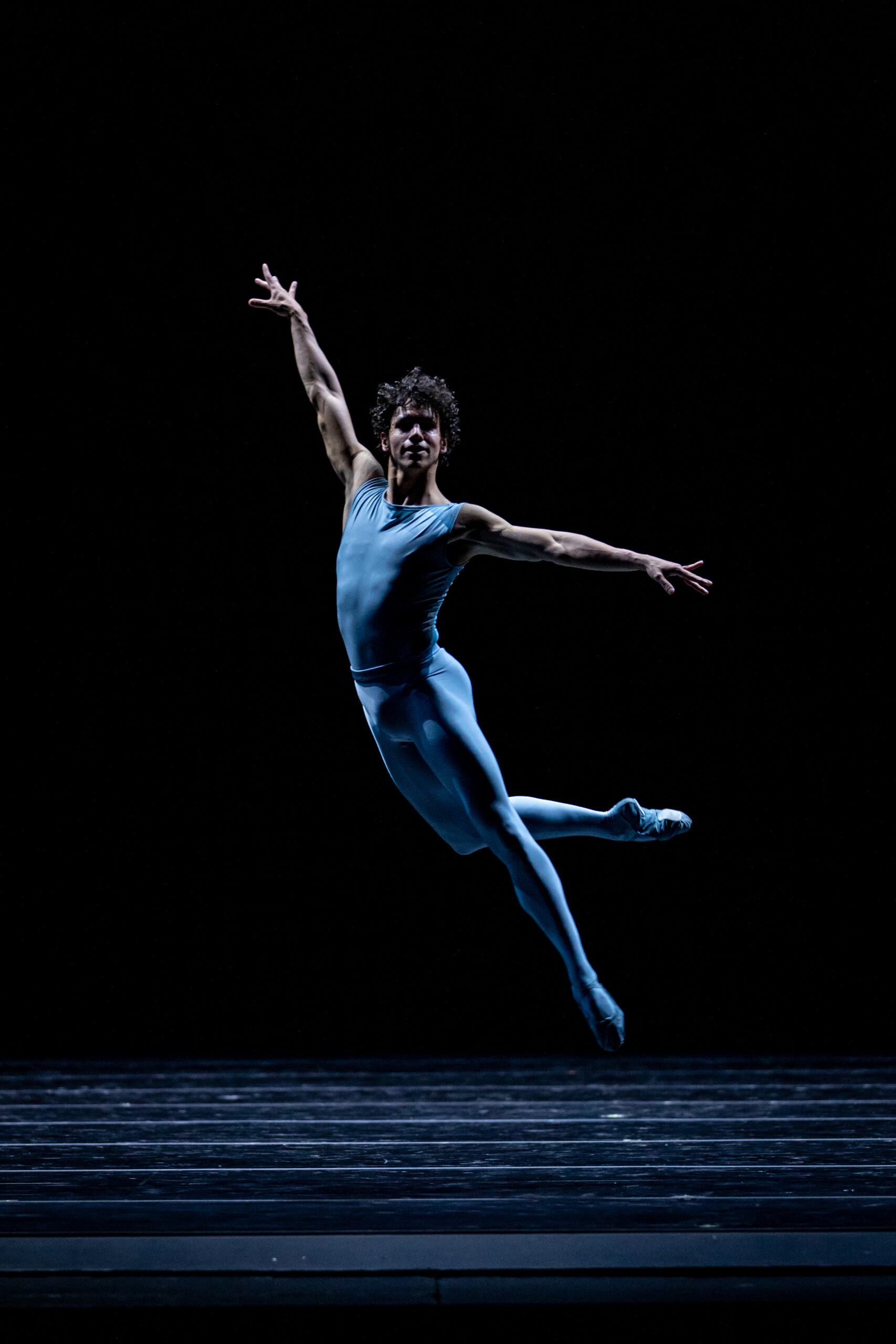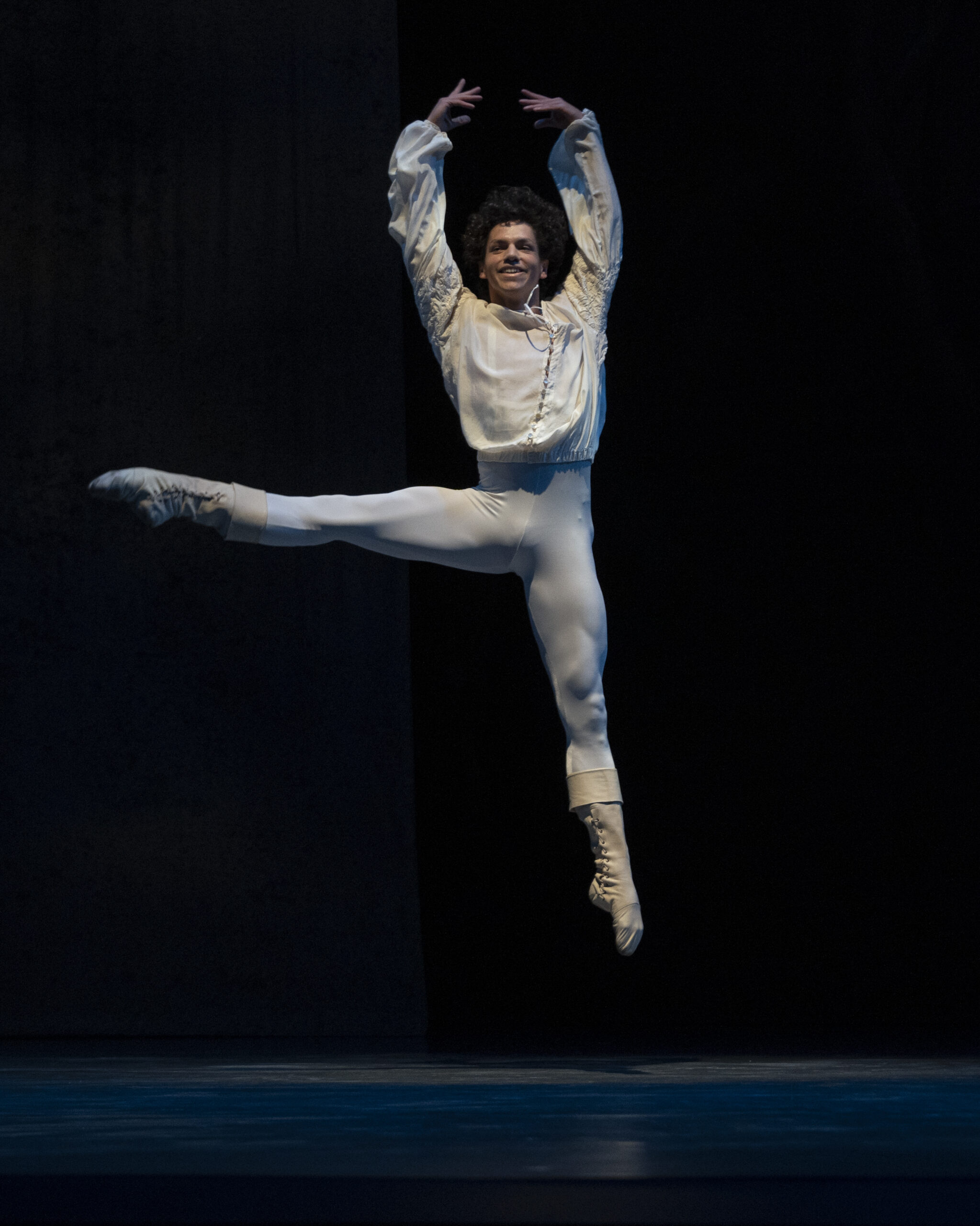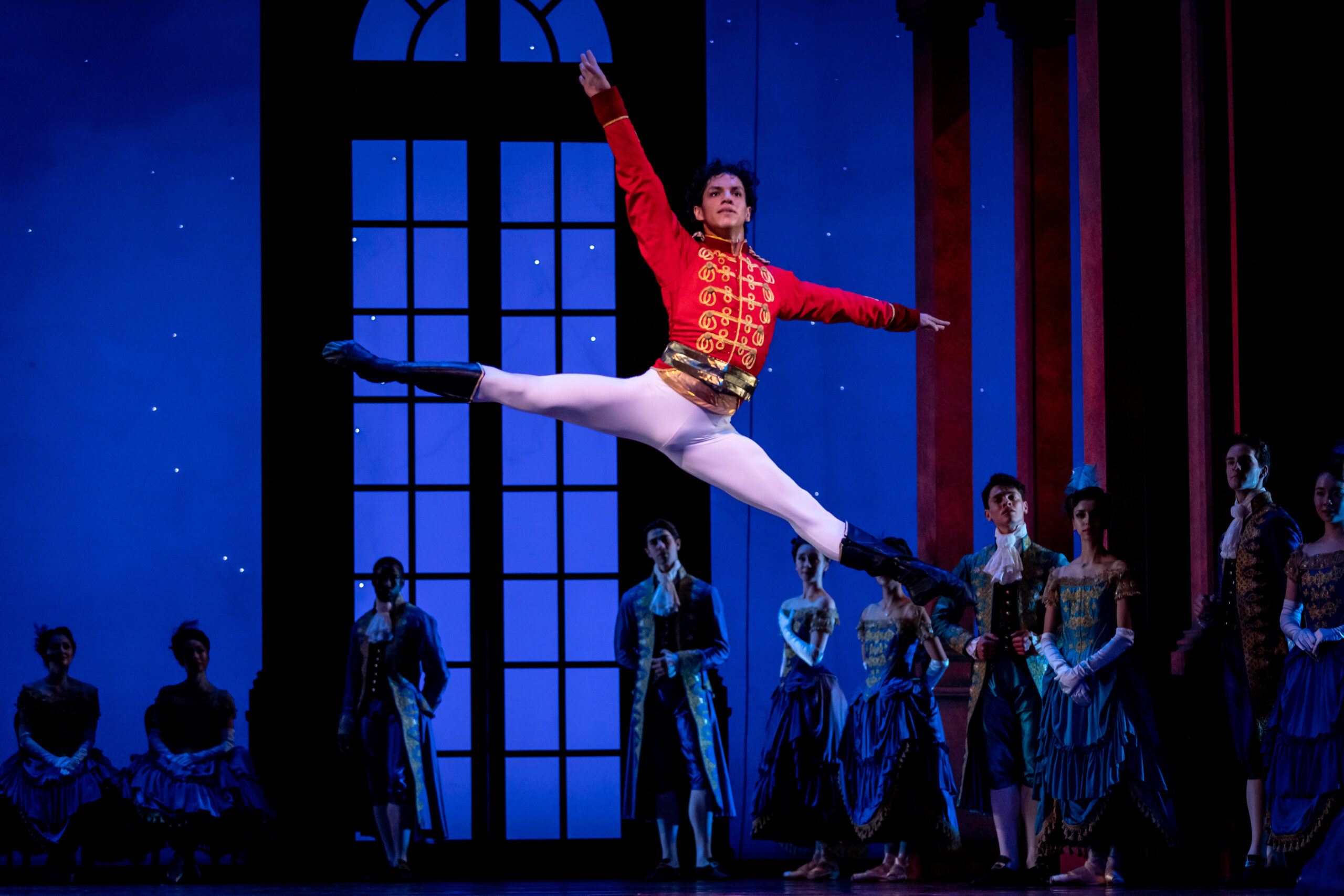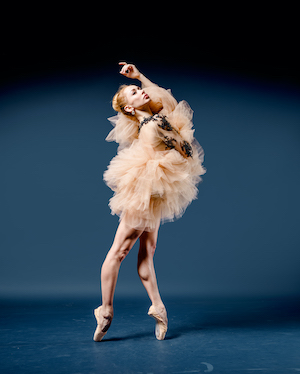Isaac Hernández is a dancer on a mission to change the lives of young aspiring dancers in his home country of Mexico. His own unique story of growing up in Guadalajara as one of 11 kids, being trained in the garden by his father, before forging a stellar international dance career, is a story that resonates with the next generation of dancers in Mexico.
It had been a busy day for the principal dancer and dad, as we chatted over zoom he was in the middle of rehearsals for Christopher Wheeldon’s Cinderella – San Francisco Ballet is currently performing until 8 April.
Isaac started the day with a back spasm from the previous day of rehearsal, so he had got up early, dropped his son at nursery, saw the physio who cracked his back, went to class, did an hour and half of rehearsals for Cinderella, saw the chiropractor, went back to rehearsal, had some lunch, then sat down for our podcast, which was followed by another two hours of rehearsal of the ballroom scene in Cinderella.
This life as a principal dancer is a long way from growing up in Guadalajara as one of 11 kids, where he was homeschooled and trained in the backyard by his father, who was a former dancer. This was back before YouTube and Tik Tok, when Isaac had no idea about the ballet world, he “didn’t know that there were competitions, that were companies, that you could have a professional career”.
Recounting his childhood days dancing in the garden, he tells of learning about a raked stage, after water dripped from the washing hang above the wooden plyboard dance floor causing it to warp. His dad told him of the raked stage at the Opéra Garnier, a stage he dreamed of performing on one day.

Isaac’s natural talent saw him win a number of prestigious awards, including at the Youth America Grand Prix, which led to interest from schools around the world. The Royal Ballet School and Paris Opera Ballet School offered him a place, but surprisingly he and his father ultimately chose Philadelphia’s The Rock School for Dance Education for its proximity to the family. This was the first of many surprising decisions that Isaac has made throughout his dance career.
After graduating, his next big decision was to either join ABT II corps de ballet or Miami City Ballet as a Soloist and the youngest member of the company. And although he was tempted by the position, the recognition, money and friends, he saw that it was too soon. He reflects, “I really loved it to the point where I almost said yes, and somewhere in my mind, I thought this is too soon. This is too much too soon…I just found that it could go out of control for me, in more of a personal sense that Miami is such a great city, I was young, I would have money, I would have some sort of recognition, I would be the youngest member in the company. So I was always really careful in those situations, because I was always taught by my parents how easy it is to really make a bad choice and for that to really change the path of your career. So with that in mind, I decided to join ABT studio company.”
But it wasn’t long before he started thinking about his next move, with his mind dreaming of Paris Opera Ballet, his heart was set on American Ballet Theatre. But after considering the different career opportunities within those companies, he set out to find his new home, choosing San Francisco Ballet in 2008. After “taking class on the stage and loving the company and just seeing so many good dancers”, he was offered a contract and accepted on the spot on the side of the stage. Isaac made this heart felt decision, joining the company at eighteen years old, going back to the corps de ballet dancing in almost every ballet, rehearsing constantly. But the company life gave him time for personal pursuits. But that came with challenges, Isaac explains,
“Six months of the year you basically just rehearse and you have the weekend. So I was living in a beautiful home with a couple of friends, I was playing golf, I was playing tennis, I was dancing. I had gotten an injury and I had a little bit of a hard time coming back from it. But I was back at it; I felt quite accomplished with what I had done….And I was all happy until one day, I realised that I was so interested in my life outside the studio, that I was afraid that I was not committing myself fully to becoming the best dancer I could possibly become.”
At the same time he saw his colleagues moving to or coming from companies in Europe and bringing their exposure and experience of other styles, other ways of working with different choreographers and companies. This made Isaac more curious about what type of dancer he could become if he ventured abroad, leading to his next brave move of deciding to leave San Francisco Ballet and join Dutch National Ballet, a decision that was not supported by his artistic director, his friends or his family.
When he arrived in Amsterdam as Soloist in 2012, he was coached by Guillaume Graffin, who became instrumental and gave Isaac advice that helped shape him as a dancer. Isaac explains, “He said, ‘this is not about me, this is not about the company. This is not about being a star, this is about making the best possible version of whichever ballet we are trying to make at the time’. He said, ‘I’m going to give you a lot of information, but I’m not giving it to you, pretending for you to do it. I want you to have as much information as possible so that when you are on stage, you can make decisions based on some knowledge, but at the same time for you to be able to develop your artistic input and artistic instinct’, because he said, ‘that the job description of a principal dancer is to make artistic choices all the time, differently for every performance’, and I really felt like that has been the best job description from a teacher or rehearsal director I’ve ever heard.”

As an ambitious dancer, Isaac was clear with the company’s Artistic Director Ted Brandsen, that he wanted to become a principal dancer and after a year of performing full length ballets, he received the coveted accolade in 2013. He said, “I’m really thankful of how Ted managed that situation. Because by the time he promoted me, I was genuinely a principal dancer, I was not a dancer that could eventually be, no I was a principal dancer because I had been able to dance Don Quixote, Sleeping Beauty and Romeo and Juliet. So when I got appointed, after Sleeping Beauty, I knew that I could do it with the job description and what was required of that position. And I feel like before that, I didn’t understand it. And now I feel quite lucky to have done it fairly quickly, but have been put through those experiences and that process to genuinely become a principal dancer and not to arrive to the position without knowing or still unsure if I’m going to be able to manage or not.”
When I asked Isaac what inspired the move from Dutch National Ballet to English National Ballet in 2015, he laughed and said “I don’t think I’m allowed to say that version”, which made me very curious to hear the story. And although I was expecting a heated discussion or an artistic disagreement, Isaac became quite insightful, looking back over his career and his achievement of becoming a celebrated Mexican principal dancer and how he could use that (my words, not his) ‘star power’ to help inspire children back in Mexico.
Isaac went on to explain that throughout his career he had been producing shows in Mexico, championing the arts, and providing opportunities for children to become professional dancers. I think that was his way of reminding himself of the extraordinary journey he’d been on and where he found himself at this time in his career. He was driven, developing his own projects, seeking funding, talking to politicians back home, meanwhile thinking about this next step in his dance career now that he’d become a principal.
It might be surprising to hear that Isaac considered joining Paris Opera Ballet, not as a principal, but starting again in the corps de ballet. But then he met with English National Ballet Artistic Director and Lead Principal Dancer Tamara Rojo, and they discussed her vision for the company, the work being commissioned from renowned choreographers like Akram Khan and Annabelle Lopez Ochoa, the new company building she was developing, and the incredible dancers in the company, Isaac was so inspired by Tamara, that he asked Ted Brandson to release him early from his contract – I think this is the version he may have been referring to earlier – But Ted being an amazing person, supported his decision, Isaac said, “I understand that was not the nicest thing for me to do. But he was really wonderful to me. He understood that I wanted to do that.”
When Isaac joined ENB, he didn’t realise that he was to dance with Tamara, “I got to London and all of a sudden I looked at the schedule and we are paired for Swan Lake, for Coppélia and for Le Corsaire. I was so intimidated. I remember I walked into the studio and I said ‘you have to be patient with me’ because in my head that didn’t make sense.”
Of course, this was the start of an incredible artistic partnership and their own love story, going on the marry and have a son together. He recalled a moment while on tour, where he looked at the mirror, and said, “you know what, I think today I graduated finally as a principal dancer, because I had finally felt that indescribable feeling of creating something unique, that had nothing to do with technique, or we know that it was just all around an artistic accomplishment. And obviously, we were in incredible shape, technically, and she was dancing incredibly, and I was dancing very well. But you had gone beyond that to the point where I thought, this is what it feels like to live one of these evenings that I dreamt of when I was a kid.”
This passion and reverence comes through as he talks about ENB and Tamara’s vision of taking the company into the future as a ballet company for our time that is forward thinking, innovative and accessible. “I love that energy and that sense of purpose and commitment to a vision. And we were doing great work, we were really performing well, and we were getting interesting commissions. And we were in a sense, leading this change that has been so remarked.”
After his six years with ENB, going through the global pandemic and coming out of lock down, Isaac and Tamara had been visiting Mexico and stopped in to see Isaac’s brother Estaban (also a dancer) perform in the San Francisco Ballet’s Gala. At the time, the company had begun looking for their next director and Tamara had started to feel she had accomplished her vision at ENB. This presented a unique opportunity for Tamara to take up a new challenge as director, with Isaac continuing to pursue his dance career at the same company.
Isaac shares how Tamara prepared for her new role and the future move in 2022, “she’s always been interested to learn, she’s an incredible researcher, and she has always been attracted to the American model of managing organisations…we talked about the future amongst us and what we want for our family? What do we expect? I feel like several things happened in the UK in the last few years where we thought that maybe the quality of life would not be what we would want for (their son) Mateo. We were driving an hour and a half each way to get to work. We were basically never spending any time with Mateo; by the time we would be home, he would be sleeping. And then he was just spending the whole time with a nanny or at the nursery. So things like that really made us consider making a move.”
San Francisco Ballet also holds a special place in Isaac’s heart, he describes it having a special feeling, like a family, where he feels at home and of course it is where his brother lives and dances. That’s quite a draw card after the challenging pandemic years, when we’ve all been separated from loved ones across the world. “It feels wonderful to be able to be on a stage with my brother, and, and to continue in an environment where that sense of purpose is everywhere. With this change of directors, I feel like the dancers are excited, the technical team is excited, the audience are excited, our patrons are excited, our board members are excited, not only for the work that we’re doing on the stage, but also for tomorrow.”
This love and respect for his family shines through when he talks about Tamara, “And I feel like these last few months, I’ve been talking to my colleagues and friends, longtime friends, and I’m so glad they’re getting the chance of working for someone like Tamara and for having that feeling…a sense of purpose, that we can reshape an organisation with the work that we put on the stage and, and obviously, is an incredibly difficult task for everyone all around. And change is always very challenging.”
We talked more about working with Tamara and he continued to light up, saying, “The sense of purpose that I found working…as an artist that curiosity to improve, to make our art form more accessible, to become a different dancer on stage than is expected, to perform in a more artistic, theatrical way, in a more interpretive way, to work on the sort of vocabulary and interpretation of classical ballet and all those questions and all that growth have come from working with [Tamara]. And the great thing is that every single person that has worked at ENB, during her time, has the same drive for knowledge and curiosity and change. And I feel like that can really change the future, reshape our art form and keep it alive and relevant. Because that is the core of her vision. And I feel like it makes perfect sense for the moment.”
And for the moment Isaac is settled, enjoying life as principal dancer, husband and father, while already looking over the dance horizon as he contemplates San Francisco Ballet being his last company before he retires from the stage. Again, a decision that is not fully supported by his family who held aspirations for him to retire in a European company, and a gold gilded opera house. But he has his own vision, “people are not aware of what an amazing organization [San Francisco Ballet] is, and what an amazing history it has and what an amazing venue and theatre we have, and the potential to really explore that and to be able to give these next years of my career to this vision and this change, and to create new work that could potentially reshape this organisation. It’s exciting, and I cannot find a better way to spend my years dancing.”
But don’t get any ideas that Isaac, who is only 33 years old, is slowing down. He’s as ambitious as ever, he has plans to continue producing, growing the project in Mexico that has changed the perception of dance for 120 million people – now that’s an achievement for Isaac, his brother and sister. They brought English National Ballet School and The Royal Ballet School to audition in Mexico for free, with 500 students auditioning, 15 new scholarships awarded and graduates going on to professional careers. Before this, Isaac’s brother Esteban was the only Mexican student to graduate from The Royal Ballet School, now they have six students. But it doesn’t stop there, they’re also putting on workshops, getting students into large venues, and creating learning opportunities for backstage roles by partnering with the Backstage Academy to provide training in production, stage production, set design, lighting etc. The impact of this work will continue to be felt for generations.
Isaac comments, “I love to think about that, because I understand that the future of dance in Mexico is no longer mine, it’s theirs, it belongs to them, and it’s up to them for this to continue to grow. My goal was for them not to be in the same place that I was where I was having to chase politicians, I have a big family so we could cover all the exits, but I still try to make them understand that it is important for Mexico to have representation in this art form, that you could change people’s lives through it, that there is a huge potential in social mobility through the arts and through the creative industry. So we’ve been very keen on working on that, and that excites me. I wish I had more time to really dive into that.”
And finally, I always love to ask dancers, choreographers and artistic directors for their advice for the next generation, here’s what Isaac had to say, “I guess it would be around personal responsibility [in regards to ballet]. I feel like oftentimes, we leave home quite early on to go into these boarding schools, and we have a path laid down in front of us. And oftentimes, it is easy to do the thing that is expected of you and just simply surrender yourself to this train that keeps going, and then you arrive at the end at your graduation, and you either make it to the company or you go audition, and then you go into these institutions, with that pride, everything for you, where you don’t even have to do your own taxes, basically. And you become this very isolated person that knows nothing about what happens around them, has no interest in the outside world, because we live in the studio, all our friends are related to the arts or to the ballet, and everything we see hear and talk about, it’s about one thing. And that is the easiest thing to do.”
“I guess my advice to them would be to take personal responsibility for their development, to obviously trust their teachers, to listen to them, but to have enough curiosity and knowledge to be able to know who you want to be or become as an artist and as a person. And I find that in order to be or to be able to give yourself a chance of succeeding as an artist, you first need to give yourself a chance at succeeding as a person and finding things that you feel passionate about, and that you want to learn about. And it’s important to really take responsibility for that and I know your education and artistic education. And not only rely on this way of doing things that has always been done, or if I do this, I’m gonna get a job and then I go into quarters of my life, and then I go to a salary or not. And I find that that is always there if you want it, but I find that it is such a great privilege to be in a world that allows us such security in a sense once we are there, and so many opportunities to travel the world to see different cultures, to meet different people.”
Listen to all of Isaac’s advice and thoughts on our podcast.

Don’t miss the chance to see Isaac Hernández perform in Christopher Wheeldon’s Cinderella running until 8 April 2023.
Get your tickets for Romeo & Juliet from 21-30 April.
For more information visit: San Francisco Ballet


